Tea and coffee hold distinctive places in the fabric of Mediterranean lifestyle, each beverage steeped in rich tradition and social significance. In Mediterranean countries, these drinks are more than just morning pick-me-ups or leisurely sips; they are central to the social life and health of communities. The ritual of consuming tea and coffee spans across all age groups and social classes, emblematic of the region’s commitment to community and conviviality. Beyond taste, these beverages contribute to the celebrated health benefits of the Mediterranean diet, which is often lauded for its balance and nutritional wholesomeness.

While tea and coffee are universally popular, their flavors and modes of preparation in Mediterranean countries are uniquely tied to the area’s cultural heritage. Each reflects the character and history of the people, from the spiced infusions of Moroccan mint tea to the robust espressos enjoyed along the Italian coastline. These beverages have transcended their roles as mere parts of a meal to form the cornerstone of social gatherings and moments of relaxation. Moreover, their consumption reflects a commitment to lifestyle choices that prioritize well-being, as many Mediterranean communities prefer these drinks in their most organic and unprocessed forms, aligning with the larger move towards a gluten-free, health-conscious diet.
Key Takeaways
- Tea and coffee are integral parts of the Mediterranean social fabric and diet, offering both historical richness and health benefits.
- The consumption patterns and preparation methods of these beverages vary across Mediterranean countries, illustrating a diverse cultural tapestry.
- Aligning with health trends, there is a growing preference for organic and gluten-free options in the Mediterranean tea and coffee culture.
Table of Contents
Historical Context of Tea and Coffee in the Mediterranean
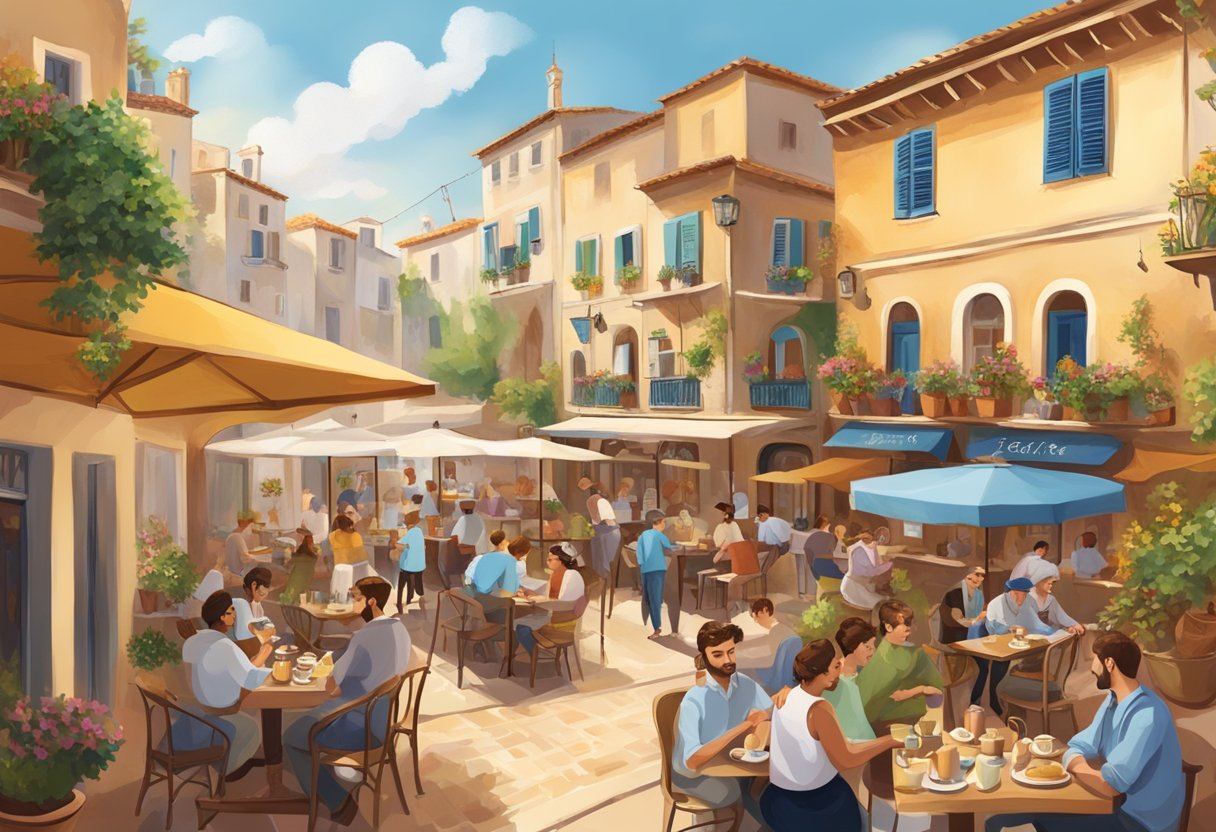
Tea and coffee have paved distinct yet intertwining paths in Mediterranean history, reflecting a tapestry of cultural exchange, trade, and social rituals. These beverages have played pivotal roles in the social and cultural fabric of Mediterranean societies.
Origins and Early Adoption
Tea, with its origins in China, was introduced to Mediterranean regions through intricate trade routes that spanned across continents. Though often associated with East Asian cultures, the Mediterranean adopted tea in a manner reflective of its own cultural aspects, blending local customs with the exotic allure of the tea plant. Coffee, by contrast, emerged from Africa and found its way to the Middle East through Arabia, where it swiftly became an integral part of the social and cultural heritage.
Spread and Development in Mediterranean Societies
As coffee spread throughout the Mediterranean, it influenced various realms of society. Coffee houses became sources of knowledge, where people gathered to discuss politics, business, and the arts. Unlike the fast-paced coffee culture that would later develop, Mediterranean coffee customs centered around leisure and conversation. Celebrating the ground beans from places like Brazil, these establishments became quintessential to local traditions.
Tea’s influence, although less pronounced than coffee’s, wove itself into the cultural tapestry of certain Mediterranean locales, adding layers to the region’s heritage. Both beverages, each with a history of being grown and prepared in specific ways, enriched the Mediterranean’s wealth of culinary practices, including those that align with a gluten-free diet.
Cultural Significance
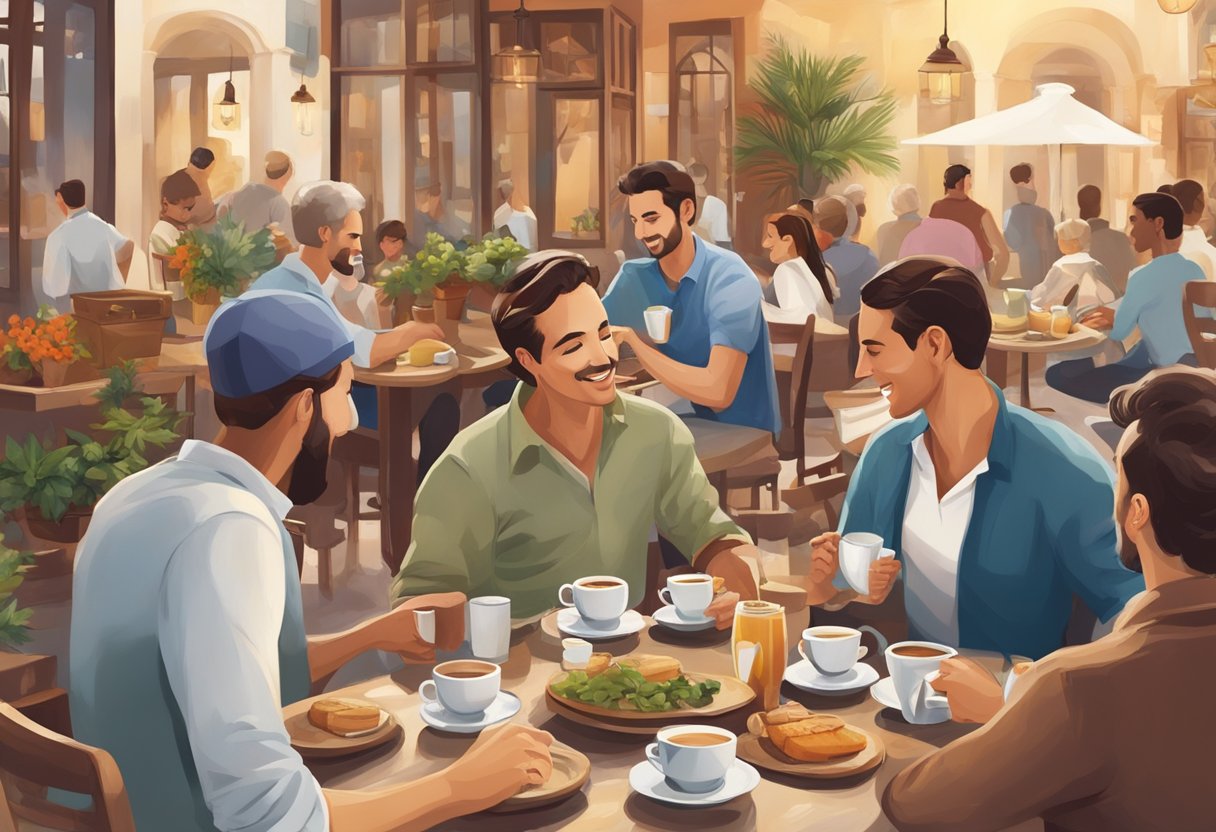
Tea and coffee hold profound cultural significance in Mediterranean countries, serving as symbols of unity and respect, whilst reflecting distinct cultural differences. These beverages are integral to social interactions, representing more than mere stimulants; they are conduits of tranquility, purity, and harmony within these vibrant cultures.
Cultural Symbols and Meanings
In Mediterranean societies, tea and coffee are potent cultural symbols. Tea, often associated with tranquility and purity, is a quintessential element of the Mediterranean diet and lifestyle. Coffee, on the other hand, represents vitality and the dynamic nature of these communities. Both beverages signify friendship and bonding, with diverse ceremonial attributes that respect cultural nuances.
Rituals and Traditions
Rituals and traditions around tea and coffee are embedded in the social fabric. For instance, the Moroccan tea ritual is a meticulous process symbolizing hospitality and community. Similarly, Italian coffee culture is revered, with each region having its specific brewing method, revealing the richness of regional identities and sustainable development practices.
UNESCO and Intangible Cultural Heritage
Some Mediterranean tea and coffee practices have been recognized by UNESCO as part of humanity’s intangible cultural heritage. This acknowledgment celebrates these beverages as invaluable carriers of heritage, promoting sustainability and protecting diverse cultural expressions in the face of globalization.
Social Functions and Gender Roles
Tea and coffee also play essential roles in defining social functions and gender roles within Mediterranean cultures. Traditionally, women are often the preparers of tea, reinforcing their integral role in maintaining family and social relationships. In contrast, coffee shops historically served as male-dominated spaces, though this is changing, reflecting a shift toward gender equality and social development.
Health and Nutrition

In the context of the Mediterranean diet, tea and coffee are not merely beverages; they play a significant role in health and nutrition when consumed as part of a balanced dietary pattern.
Tea and Coffee in Mediterranean Diet
The Mediterranean diet, rich in fruits, vegetables, whole grains, and healthy fats, often includes tea and coffee as complementary components. These beverages are typically enjoyed in social settings and are integral to many Mediterranean cultures. Nutritionally, tea and coffee contribute beneficial compounds, such as antioxidants, which can support overall health when consumed in moderation as part of this diet.
Potential Health Benefits
Regular consumption of tea and coffee within the framework of the Mediterranean dietary pattern may offer several health benefits:
- Cardiovascular Health: Research suggests that certain compounds in coffee and tea, such as antioxidants, may support cardiovascular health by improving blood vessel function and reducing inflammation.
- Balanced Blood Sugar: Components found in these beverages have also been associated with a lower risk of type 2 diabetes, which is a common concern in public health.
- Cognitive Function: Some studies indicate that moderate intake may be linked to a slower rate of cognitive decline, relevant to aging populations in the Mediterranean and beyond.
Public Health Implications
The adoption of tea and coffee consumption as part of the Mediterranean diet has implications for public health policy:
- Disease Prevention: Promoting these beverages as part of a balanced diet could aid in the prevention of non-communicable diseases.
- Nutritional Guidance: Public health initiatives could emphasize the benefit of antioxidants found in tea and coffee as part of a gluten-free Mediterranean diet.
- Healthy Habits: Encouraging moderate consumption in social and cultural contexts reinforces the importance of dietary patterns that align with a holistic approach to health.
Economic Aspects and Sustainability
In Mediterranean countries, tea and coffee are not just beloved beverages; their production and consumption are key to understanding the region’s economy and environmental stewardship. This section delves into the concrete influences that these two commodities have on sustainable growth and ecological balance.
Agriculture and Harvesting Practices
Tea and coffee cultivation are significant to the Mediterranean’s agricultural sector, with practices evolving to meet the demand for sustainable diets. Ensuring the sustainability of these practices often involves prioritizing organic farming techniques that support biodiversity and reduce environmental impact. Harvesting methods are being refined to maintain soil health and manage water use efficiently, improving overall productivity.
Environmental Impact and Biodiversity
The environmental footprint of tea and coffee is a matter of growing concern. Sustainable production efforts focus on minimizing water usage and preserving the natural habitat to protect the biodiversity of the Mediterranean region. Challenges include effectively managing the waste from coffee processing and reducing the reliance on chemical fertilizers that can harm local ecosystems.
Market Dynamics and Price Volatility
The coffee and tea markets are subject to significant price volatility, influenced by both environmental factors and international trade dynamics. This volatility impacts not just the producers but also the consumers, brands, and overall food production security in the region. Development of fair-trade policies and direct trade relationships can help stabilize prices and ensure more equitable income distribution among local farmers.
Sustainability Dimensions in Production
Incorporating sustainability dimensions into tea and coffee production is central to addressing the challenges of food security in the Mediterranean. This encompasses everything from cultivating crops with lower water needs to promoting sustainable diets among consumers. Brands are increasingly recognizing that sustainable production is not a choice but a necessity in facing the pressing environmental concerns of our times.
Social Dynamics and Consumption Patterns
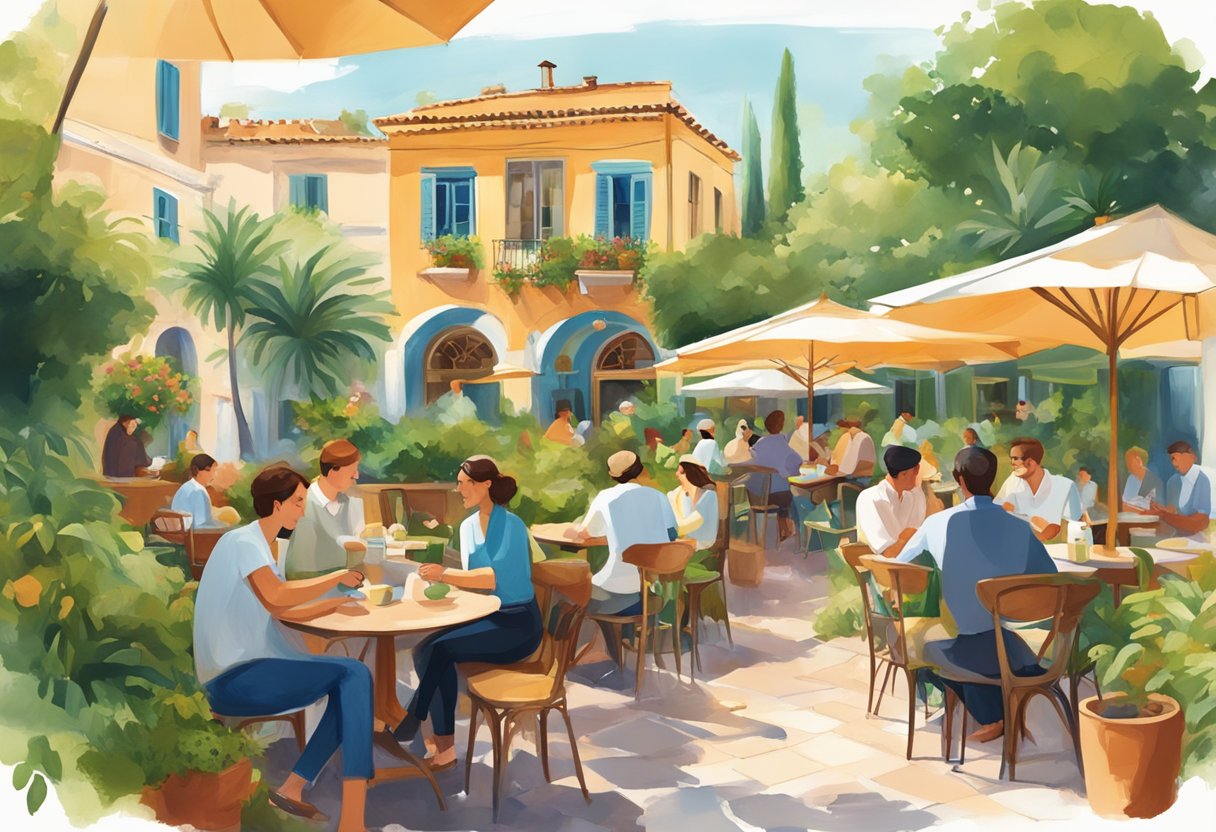
Tea and coffee play pivotal roles in shaping the social fabric of Mediterranean societies. These beverages are not just consumed for their taste or stimulating effects but also serve as important conduits for social engagement and cultural expression.
Cultural Capital and Social Stratification
In Mediterranean countries, tea and coffee consumption reflects cultural capital, contributing to social stratification. Elite groups often favor specialty or high-end varieties, which symbolize status and education. Traditional preparation methods become rituals, enhancing a community’s cultural identity and emphasizing respect within social hierarchies.
Conviviality and Commensality
Mediterranean society greatly values conviviality and commensality; consuming tea and coffee together fosters a sense of belonging and peace. These shared moments reinforce community bonds and are central to both formal and informal social interactions. Unity and bonding over a cup of tea or coffee are hallmarks of the regional culture.
Changing Consumption Trends
Recent shifts see Mediterranean populations embracing modernity while retaining traditional values. Innovative tea and coffee blends enter the market, yet classic styles remain integral for rituals and social relationships. This balance supports socio-cultural aspects vital to the quality of life, showing adaptability without sacrificing cultural capital or productivity in communal life.
Tea and Coffee Preparation and Varieties
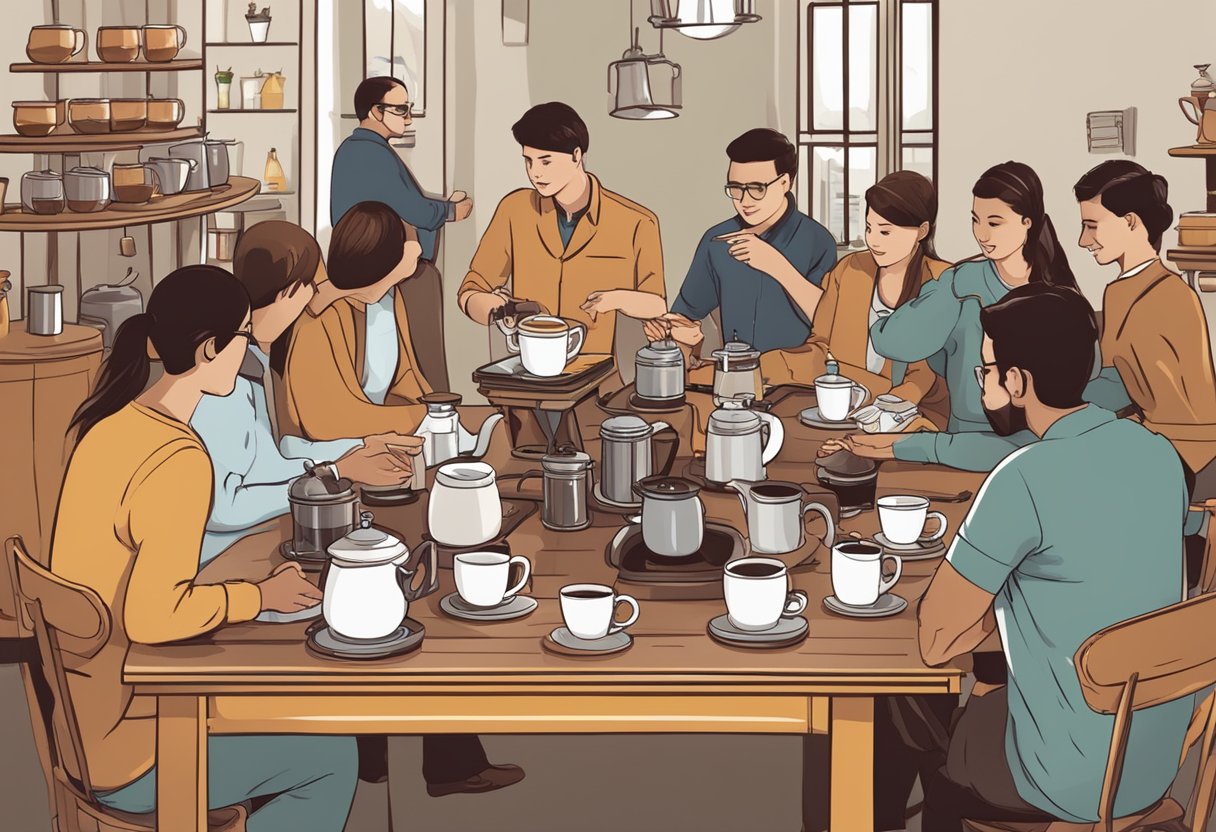
In Mediterranean countries, the preparation of tea and coffee is a thoughtful process that honors tradition, and the resulting beverages reflect the region’s diverse cultural heritage and rich agricultural offerings.
Traditional Methods of Preparation
The traditional preparation of tea often involves steeping loose, dried leaves, such as those for black tea, which is a staple in Mediterranean diets. In contrast, coffee may be finely ground and brewed using methods like the characteristic Greek or Turkish coffee, where it’s boiled together with sugar and served with its grounds.
Influence of Local Products and Seasonality
Regional dietary patterns influence the creation of tea and coffee infusions, to which local products like fresh herbs or spices are added depending on seasonality. This not only provides a unique sensory experience but also aligns with the gluten-free Mediterranean diet, emphasizing natural, non-processed ingredients.
Varieties of Tea and Coffee across Regions
The Mediterranean basin cultivates an array of tea and coffee varieties. While black tea is pervasive, herbal teas using local flora like sage, chamomile, and mint are common for their health benefits. Coffee varieties range from the thick, strong espresso in Italy to the light and spiced versions in North Africa.
Lifestyle and Community Engagement
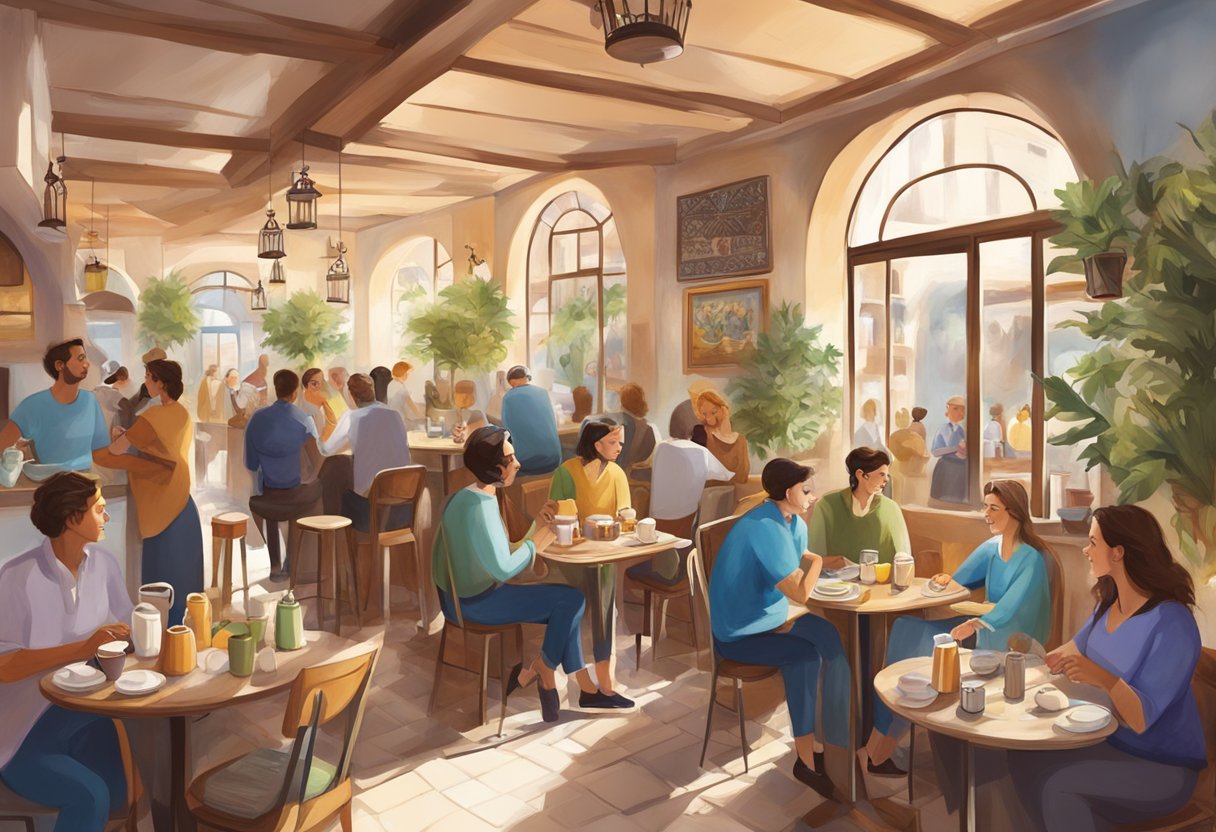
In Mediterranean countries, the interplay of diet, social customs, and communal festivities shapes a unique lifestyle that bolsters community ties and individual well-being.
Mediterranean Lifestyle and Dietary Patterns
The Mediterranean lifestyle encompasses a dietary pattern rich in fruits, vegetables, whole grains, legumes, nuts, and seeds with a focus on variety and nutrient density. Gluten-free options, such as rice, quinoa, and certain beans, align seamlessly with this dietary framework, promoting pleasure and well-being through diverse flavors and textures. Olive oil serves as a cornerstone, enhancing the taste and health properties of gluten-free alternatives.
Food Sharing and Social Life
Communal dining is central to social life in the Mediterranean, with an emphasis on food sharing and the pleasure of conviviality. Meals are often leisurely affairs that foster commensality, allowing people to enjoy gluten-free dishes together, strengthening bonds across generations and reinforcing a sense of community. The act of sharing food transcends dietary restrictions, cementing relationships and reinforcing the importance of inclusivity in social settings.
Community Events and Cultural Festivities
Community events and cultural festivities are vibrant expressions of the Mediterranean lifestyle, where culinary traditions merge with social celebrations. Local markets, street fairs, and festivals often feature gluten-free Mediterranean cuisine, ensuring that dietary patterns sync with social enjoyment and cultural appreciation. Through these gatherings, the values of pleasure, well-being, and social life are shared and cherished, cementing dietary habits into the fabric of community life.
Consumer Culture and Social Spaces
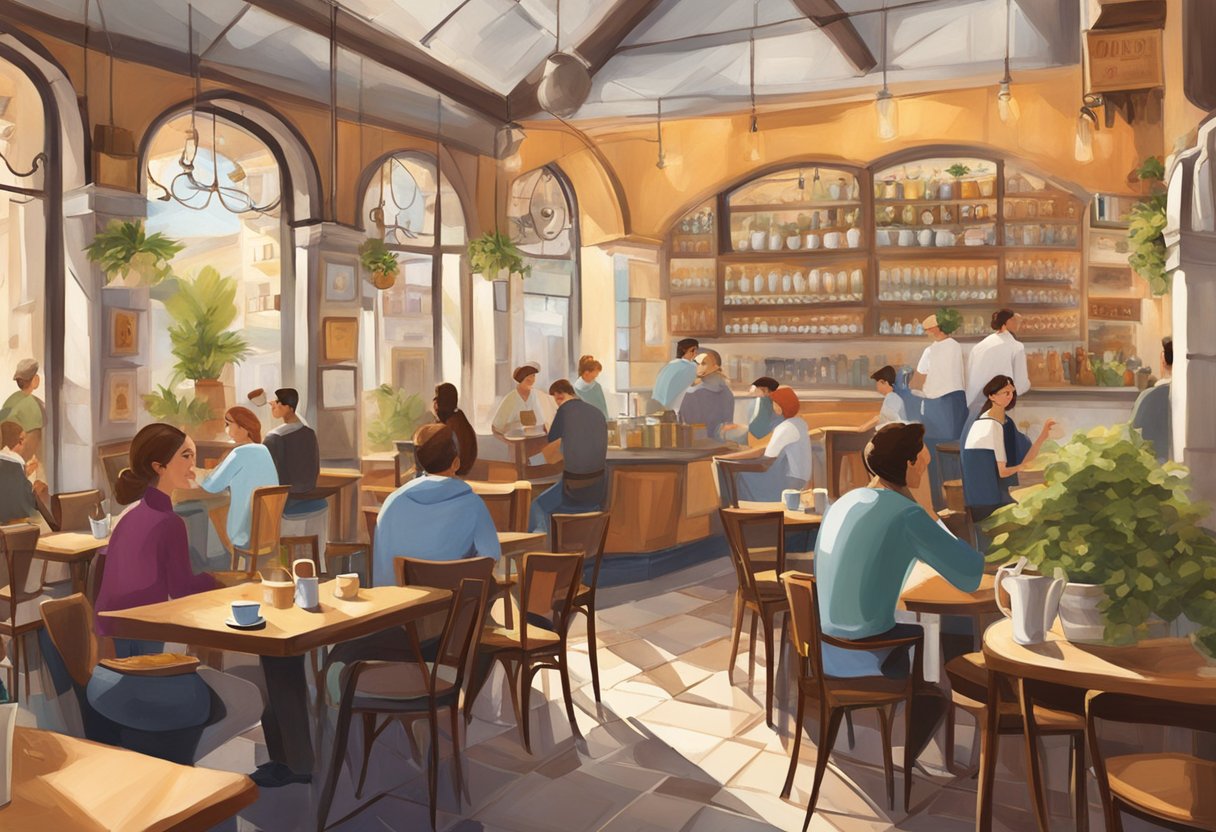
In Mediterranean countries, coffee shops and tea traditions reflect a deep-rooted consumer culture that’s integral to social life and health. These venues serve not only as places to enjoy a beverage but also act as platforms for a myriad of social interactions and cultural expressions.
Coffee Shops as Social Hubs
In the bustling streets of Mediterranean cities, coffee shops are more than just a place to get a caffeine fix; they are social institutions. They range from traditional establishments where elder locals spend hours over a single cup to modern cafes catering to young consumers and tourists. These spaces offer a common ground for people from all walks of life, fostering social cohesion. Patrons often engage in animated conversations, intense debates, and casual networking, which are crucial aspects of Mediterranean social life.
Tea and Coffee in Material Culture
Tea and coffee play significant roles in Mediterranean food cultures, becoming symbols of hospitality and tradition. They are omnipresent in home kitchens and dining rooms where serving these beverages to guests is a sign of warmth and generosity. In terms of material culture, tea sets and coffee pots, often intricate and ornamental, hold pride of place in homes, reflecting cultural differences and familial heritage.
Networking and Business Socializing
The role of food systems within Mediterranean consumer culture extends into the realm of business and networking. The relaxed atmosphere of a coffee shop provides a neutral setting conducive to business interactions. Here, social interactions are seamlessly blended with professional dealings, as many entrepreneurs and professionals use these spaces to conduct meetings, negotiate deals, and create valuable connections. This intersection of culinary enjoyment and networking is a unique aspect of Mediterranean food cultures, illustrating the versatility of these social spaces.
Contemporary Challenges and Future Outlook

As the Mediterranean region encounters changes due to globalization, shifts in public health and dietary patterns, and the imperative for sustainable practices, tea and coffee culture face distinct challenges and a transformative future.
Global Influences and Local Traditions
In the Mediterranean, tea and coffee are steeped in tradition yet face pressures from global influences. Emerging trends in dietary patterns, like the rise of gluten-free living, necessitate adaptations in local food systems. While these beverages remain cultural staples, their preparation and consumption rituals must evolve, balancing the preservation of cultural differences with contemporary gustatory preferences.
Health and Lifestyle Adjustments
Health benefits of tea and coffee are often highlighted in the Mediterranean dietary pattern. However, the public’s increased awareness of health issues such as gluten intolerance is prompting changes within public health guideline. Sustainable development goals emphasize the importance of healthy lifestyles, leading to a fusion of traditional Mediterranean habits with health and lifestyle adjustments, such as incorporating gluten-free options to cater to a diverse population’s needs.
Advancements in Sustainable Practices
Sustainability is a growing concern, and the tea and coffee industries are no exception. Advancements in sustainable practices are shaping the production and trade within these sectors. The focus on sustainable development in agriculture aligns with the environmentally conscious dietary patterns of the Mediterranean diet. This synergy drives the development of practices that not only protect the environment but also enhance the resilience of food systems against climate change.
Frequently Asked Questions
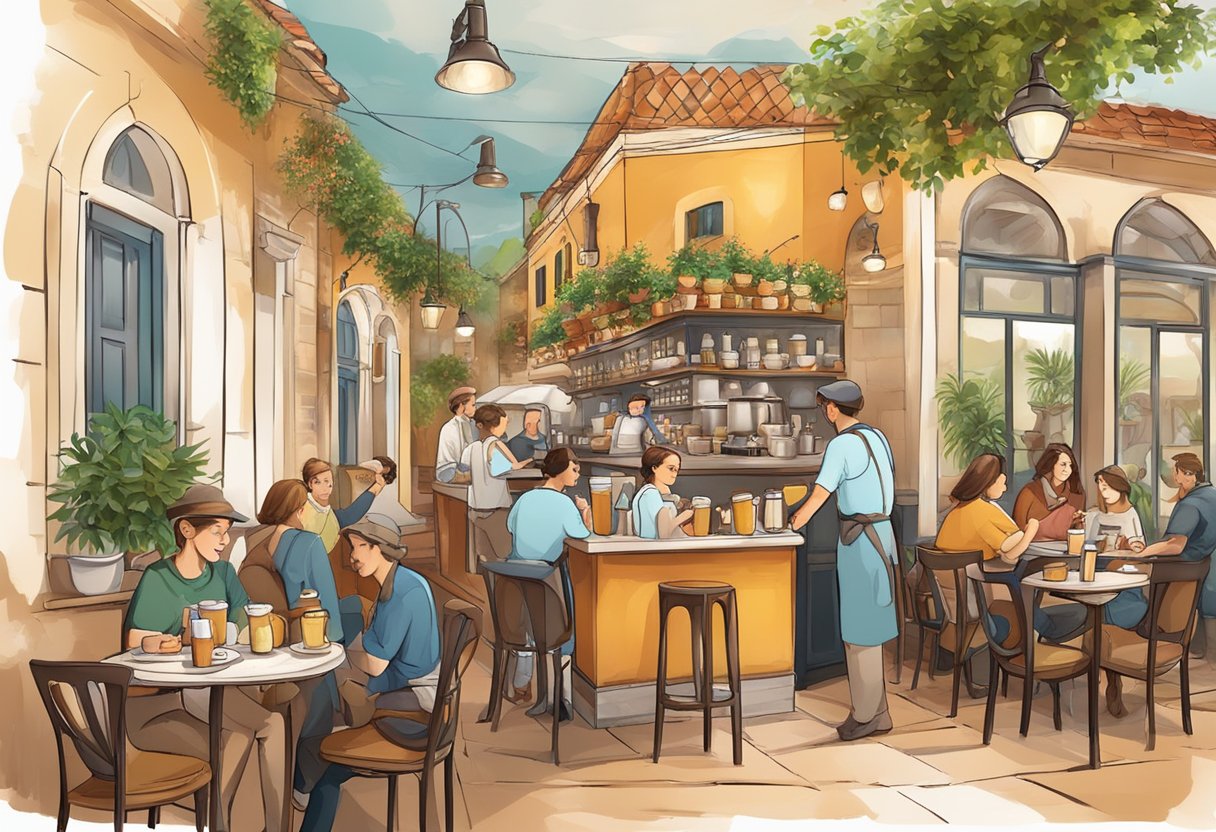
Exploring the realms of coffee and tea in Mediterranean societies uncovers a rich tapestry of cultural practices and potential health implications. These beverages are not just staple diets; they carry historical significance and contribute to local branding.
What is the historical significance of coffee in Middle Eastern society?
Coffee has served as a central part of Middle Eastern society for centuries, initially emerging as a prominent feature of social gatherings and intellectual discourse in places like Yemen and spreading throughout the Islamic world.
How is coffee traditionally consumed in the Middle East and how does this reflect cultural practices?
Traditionally, coffee in the Middle East is served strong, black, and often with spices such as cardamom, embodying a tradition of hospitality and leisure, where serving coffee is an offer of friendship and a vital element of social life.
What are the potential health implications of regular tea consumption?
Regular tea consumption can offer numerous health benefits, such as antioxidants that contribute to reduced inflammation and improved heart health, although excessive intake may lead to negative effects such as reduced iron absorption.
What role do local Middle East coffee brands play in defining the regional coffee culture?
Local Middle East coffee brands enhance the regional coffee culture by preserving traditional preparation methods while also adapting to contemporary tastes, thus maintaining the beverage’s cultural relevance.
How do coffee and tea compare in terms of their health benefits and risks?
Coffee and tea both offer health benefits like antioxidants and potential risks when consumed in excess, like potential sleep disruption from coffee or tea’s impact on iron absorption, with moderation being the key to maximizing their health-promoting properties.
Can coffee and tea be incorporated into a Mediterranean diet, and if so, how?
Coffee and tea can complement a Mediterranean diet, which emphasizes plant-based foods and healthy fats, with their inclusion offering a cultural touchstone as well as polyphenols that align with the diet’s focus on nutrient-rich, whole foods.



